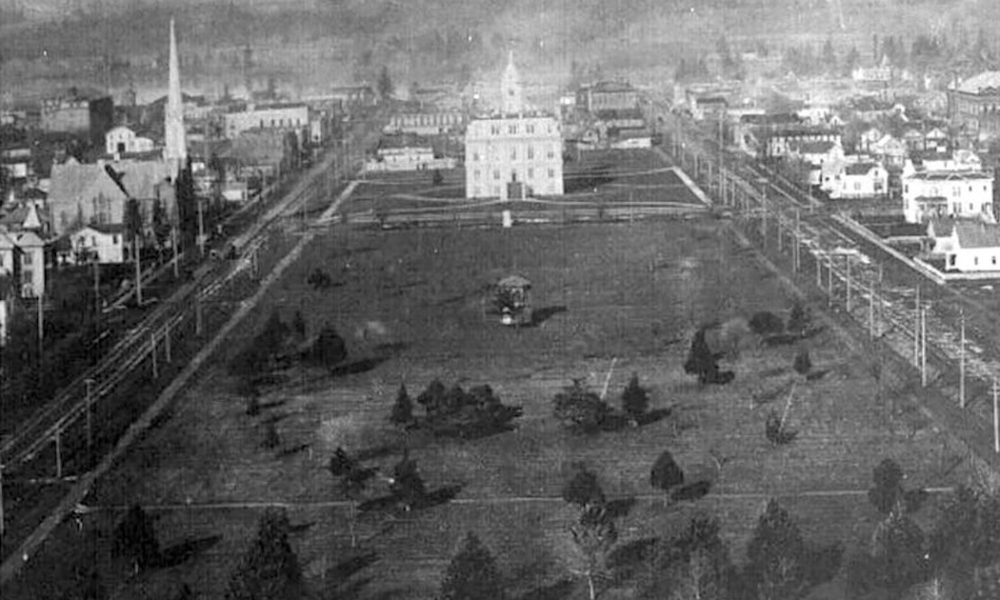 The city of Salem as it appeared when looking west from the dome of the capitol building in the late 1800s. PHOTO COURTESY SALEM PUBLIC LIBRARY
The city of Salem as it appeared when looking west from the dome of the capitol building in the late 1800s. PHOTO COURTESY SALEM PUBLIC LIBRARY
On April 1, 1884, an event occurred that probably should have tipped 25-year-old woodcutter Joseph Drake off that bad things were coming his way:
His neighbor, David Swartz, filed for divorce from his wife, Mary and listed Joseph as the primary cause. Specifically, David claimed Mary had committed adultery with Joseph on March 21, 1884.
With most frontier Oregonians, this would have been cause for some discomfort, whether it was true or not. But for Joseph Drake, it probably should have been his cue to slip out of town in the middle of the night. That’s because Joseph was African-American, one of a tiny handful of black people living in Salem and the surrounding countryside – and the Civil War had ended less than 20 years before.
Joseph apparently felt safe enough, though. He was boarding with the Swartzes’ neighbors, William and Emma Henry, and Delinda Henry, William’s mother. The Henrys, although they were good friends with Mary Swartz, had absolutely no use for her husband. So it’s understandable that Joseph Drake would feel fairly well protected from any kind of trouble David Swartz might make for him.
Understandable – and dead wrong.
The trouble started on May 3, 1884. On that evening, while Emma Henry and mother Delinda were cooking dinner, William went out to bring the cows in, and Joseph came with him, hoping to do some hunting. When they returned, Mary Swartz was at the house with her son George, and everyone had supper together.
It’s what happened after supper that’s in dispute.
According to Joseph, he passed the evening quietly, going outside to smoke his pipe and relax. Presently young George ran to fetch him inside, where Mary Swartz asked him if he could take some eggs into town for her. He agreed, and then she and George left, and Joseph went off to bed.
But according to all three of the Henrys, that’s not what happened at all.
Delinda and Emma both testified that Joseph Drake and Mary Swartz had an ”intimate conversation” in a quiet corner of their house, then left together for the Swartz house, having learned that David Swartz had gone to the mill for a load of lumber and would not be home until very late.
Both the Henry women testified that Joseph and Mary were having an affair, and both testified that they had heard Joseph threaten to kill David Swartz, and that the next morning he was openly boasting about having done the job.
And William? William testified that he and Joseph went out that night and waylaid David Swartz as he was coming back home with his load of lumber. William had stepped out to stop David, and then Joseph had shot David from ambush, badly wounding him; then, William said, he had run up and snatched William’s pistol away from him and, as David writhed on the ground, shot him in the neck to finish the job.
So, was it true? Was young Joseph Drake a cold-blooded killer – ready and willing, with no particularly strong motive, to murder his alleged lover’s ex-husband after filling the ears of three witnesses with the details of his plan and letting one of them witness it directly? And after having done this, did he calmly go home, climb into bed and carry on with his ordinary life, waiting for the sheriff to come slap the cuffs on him?
Yes, the jury decided; that’s exactly what happened.
It’s hard not to see the taint of post-Reconstruction racism at work here, both in the Henry family’s willingness to throw Joseph under the bus and in the jury’s willingness to swallow that whopper. It’s also hard not to look at the details of the case and spin out other possible sequences of events: an angry exchange between David Swartz and William Henry leading to a gunshot, then another one; a hasty retreat to the Henry house to huddle with Emma and Delinda, hashing out a plan to save William Henry from the gallows by pinning the murder on the black guy now peacefully sleeping off a long hard workday; and, the following morning, the betrayal.
Delinda nearly blew the whole game, because she couldn’t keep her story straight; she testified at the preliminary hearing that Emma was sick and she was up all night taking care of her, and then testified at the trial that she went to bed early. But the jury was, it seems, in a forgiving mood, so to speak.
Perhaps to his surprise, William Henry found himself in almost as much trouble as Joseph. If he did make up the whole story, he rather overdid it by placing himself at the scene of the murder and giving himself a minor role in the actual killing. Hauled into court for his role in the ambush that he’d essentially confessed to in open court, he was sentenced to life in the Oregon State Penitentiary, and had it not been for Governor Sylvester Pennoyer pardoning him out in 1893 after he’d served nine years, he’d have passed the rest of his life behind bars.
As for Joseph Drake, he went to his fate with bravery and stoicism, if with some obvious trepidation. Although most of Salem had by that time come to believe either that he was innocent or at least that he was not guilty enough to merit hanging, a huge crowd gathered to watch the deed done, and to hopefully hear him finally confess to his crime, now that the scaffold was nigh and eternity near.
What they heard may have made them pretty uncomfortable, because even now, with nothing to gain by dissembling, Drake was not only firmly and quietly insistent on his innocence, but surprisingly gracious toward the people who had apparently played the Judas Iscariot with his young life.
”I am going to be hanged for the company I keep and not for the crime I committed,” he told them. ”I have not much to say. I am going to be executed for a crime I know nothing about. … I lived with William Henry some time and did not think him a very bad man. Henry surely did the work if he knew anything about it. I think it is pretty hard that I have to lay down my life like this. I can’t say who did the work, for I was not there. I know I have been rudely dealt with. I thank the people who have tried to help me for their kindness. … (Marion County Sheriff) Mr. Minto’s folks have done a good part by me and I thank them for it. They treated me kindly and given me all the privileges possible under the circumstances.”
Joseph Drake was hanged at 1:48 p.m. on March 27, 1885. His was the first legal execution of an African-American in Oregon history.
It would be interesting to know what became of the Henry family after the hanging, but I have been unable to learn anything further about them.
(Sources: Goeres-Gardner, Diane L. Necktie Parties: Legal Executions in Oregon 1851-1905. Caldwell, Idaho: Caxton Press, 2005; archives of the Portland Morning Oregonian, April-May 1884)
Finn J.D. John teaches at Oregon State University and writes about odd tidbits of Oregon history. For details, see http://finnjohn.com. To contact him or suggest a topic: [email protected] or 541-357-2222.








